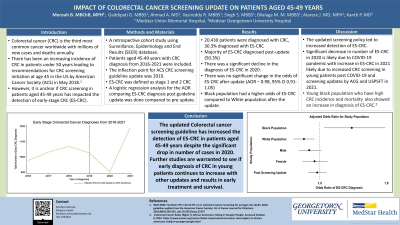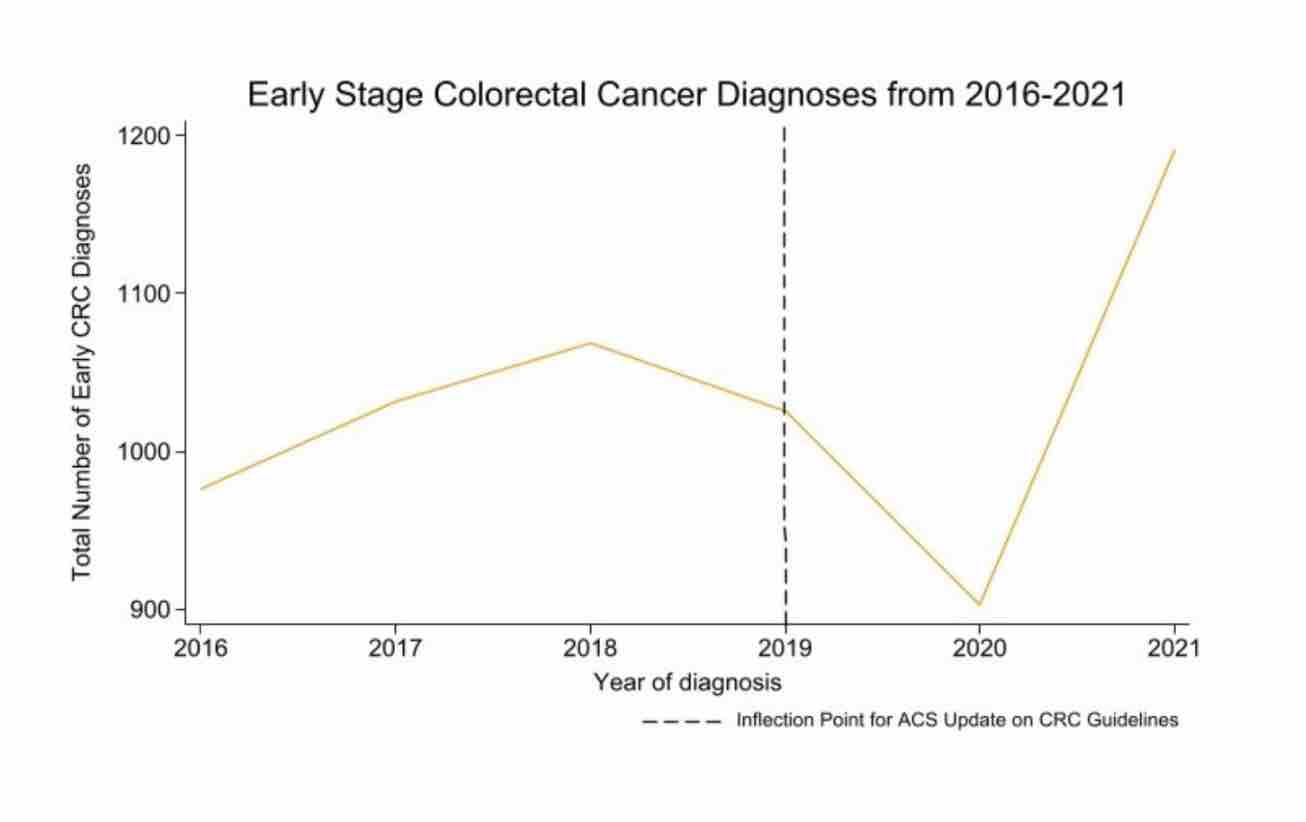Sunday Poster Session
Category: Colorectal Cancer Prevention
P0419 - Impact of Colorectal Cancer Screening Update on Patients Aged 45-49
Sunday, October 27, 2024
3:30 PM - 7:00 PM ET
Location: Exhibit Hall E

Has Audio
.jpg)
Boniface Mensah, MBChB, MPH
MedStar Union Memorial Hospital
Baltimore, MD
Presenting Author(s)
Boniface Mensah, MBChB, MPH1, Greeshma Gaddipati, MBBS1, Ahmad Amin, MD1, Ramya Vasireddy, MBBS1, Simardeep Singh, MBBS1, Mariah Malak Bilalaga, MBBS1, Joseph Atarere, MD, MPH1, Ted Akhiwu, MBBS, MPH1, Priyanka Kanth, MD2
1MedStar Union Memorial Hospital, Baltimore, MD; 2MedStar Georgetown University Hospital, Washington, DC
Introduction: Colorectal cancer (CRC) is the third most common cancer worldwide, with millions of new cases and deaths annually. There has been an increasing incidence of CRC in patients under 50 years, leading to recommendations for CRC screening initiation at age 45 in the United States by the American Cancer Society (ACS) in May 2018. However, it is unclear if CRC screening at ages 45-49 has impacted odds of detection of Early CRC.
Methods: We performed an observational study using the Surveillance, Epidemiology, and End Results (SEER) database, including patients aged 45-49 with a colorectal cancer diagnosis from 2016- 2021, with 2019 as an inflection point of ACS guideline update. We used logistic regression to analyze the odds of early-stage CRC in ages 45-49 pre- and post-screening guideline update. Early CRC was defined as stage 1 and 2 CRC.
Results: During the study period, 20,430 persons were diagnosed with CRC, with 49% being diagnosed before the update and 51% afterward. Among these, 6,195 (30.3%) were diagnosed with early CRC, with 49.7% being diagnosed pre-update and 50.3% post-update. As illustrated in Figure 1, the number of early CRC diagnoses declined in the year 2020. We found no significant difference in the odds of diagnosis of early-stage CRC after the change in the screening guidelines. (AOR- 0.98, 95% CI 0.91-1.05). However, the odds of early CRC diagnosis post-update were 1.24 times higher for the Black population compared to the White population.
Discussion: We conclude that changing the screening guidelines did not significantly impact the odds of early CRC among individuals aged 45-49. Despite screening healthy and asymptomatic individuals post update, the odds of detection of early CRC remained consistent with that of pre-update where only symptomatic individuals or those with family history were screened. This suggests that the updated screening policy led to increased detection of Early CRC, and hence is beneficial. We also noted that there were higher odds of diagnosis of early CRC in the black population, likely due to higher incidence and prevalence of disease in this group and higher number of screening colonoscopies as per ACG recommendation for early screening in this group way back in 2005. It will be interesting to see if similar effects will be observed in the general population in the coming years, warranting further studies.

Note: The table for this abstract can be viewed in the ePoster Gallery section of the ACG 2024 ePoster Site or in The American Journal of Gastroenterology's abstract supplement issue, both of which will be available starting October 27, 2024.
Disclosures:
Boniface Mensah, MBChB, MPH1, Greeshma Gaddipati, MBBS1, Ahmad Amin, MD1, Ramya Vasireddy, MBBS1, Simardeep Singh, MBBS1, Mariah Malak Bilalaga, MBBS1, Joseph Atarere, MD, MPH1, Ted Akhiwu, MBBS, MPH1, Priyanka Kanth, MD2. P0419 - Impact of Colorectal Cancer Screening Update on Patients Aged 45-49, ACG 2024 Annual Scientific Meeting Abstracts. Philadelphia, PA: American College of Gastroenterology.
1MedStar Union Memorial Hospital, Baltimore, MD; 2MedStar Georgetown University Hospital, Washington, DC
Introduction: Colorectal cancer (CRC) is the third most common cancer worldwide, with millions of new cases and deaths annually. There has been an increasing incidence of CRC in patients under 50 years, leading to recommendations for CRC screening initiation at age 45 in the United States by the American Cancer Society (ACS) in May 2018. However, it is unclear if CRC screening at ages 45-49 has impacted odds of detection of Early CRC.
Methods: We performed an observational study using the Surveillance, Epidemiology, and End Results (SEER) database, including patients aged 45-49 with a colorectal cancer diagnosis from 2016- 2021, with 2019 as an inflection point of ACS guideline update. We used logistic regression to analyze the odds of early-stage CRC in ages 45-49 pre- and post-screening guideline update. Early CRC was defined as stage 1 and 2 CRC.
Results: During the study period, 20,430 persons were diagnosed with CRC, with 49% being diagnosed before the update and 51% afterward. Among these, 6,195 (30.3%) were diagnosed with early CRC, with 49.7% being diagnosed pre-update and 50.3% post-update. As illustrated in Figure 1, the number of early CRC diagnoses declined in the year 2020. We found no significant difference in the odds of diagnosis of early-stage CRC after the change in the screening guidelines. (AOR- 0.98, 95% CI 0.91-1.05). However, the odds of early CRC diagnosis post-update were 1.24 times higher for the Black population compared to the White population.
Discussion: We conclude that changing the screening guidelines did not significantly impact the odds of early CRC among individuals aged 45-49. Despite screening healthy and asymptomatic individuals post update, the odds of detection of early CRC remained consistent with that of pre-update where only symptomatic individuals or those with family history were screened. This suggests that the updated screening policy led to increased detection of Early CRC, and hence is beneficial. We also noted that there were higher odds of diagnosis of early CRC in the black population, likely due to higher incidence and prevalence of disease in this group and higher number of screening colonoscopies as per ACG recommendation for early screening in this group way back in 2005. It will be interesting to see if similar effects will be observed in the general population in the coming years, warranting further studies.

Figure: Total number of early colorectal cancer diagnoses in 2016-2021
Note: The table for this abstract can be viewed in the ePoster Gallery section of the ACG 2024 ePoster Site or in The American Journal of Gastroenterology's abstract supplement issue, both of which will be available starting October 27, 2024.
Disclosures:
Boniface Mensah indicated no relevant financial relationships.
Greeshma Gaddipati indicated no relevant financial relationships.
Ahmad Amin indicated no relevant financial relationships.
Ramya Vasireddy indicated no relevant financial relationships.
Simardeep Singh indicated no relevant financial relationships.
Mariah Malak Bilalaga indicated no relevant financial relationships.
Joseph Atarere indicated no relevant financial relationships.
Ted Akhiwu indicated no relevant financial relationships.
Priyanka Kanth indicated no relevant financial relationships.
Boniface Mensah, MBChB, MPH1, Greeshma Gaddipati, MBBS1, Ahmad Amin, MD1, Ramya Vasireddy, MBBS1, Simardeep Singh, MBBS1, Mariah Malak Bilalaga, MBBS1, Joseph Atarere, MD, MPH1, Ted Akhiwu, MBBS, MPH1, Priyanka Kanth, MD2. P0419 - Impact of Colorectal Cancer Screening Update on Patients Aged 45-49, ACG 2024 Annual Scientific Meeting Abstracts. Philadelphia, PA: American College of Gastroenterology.
